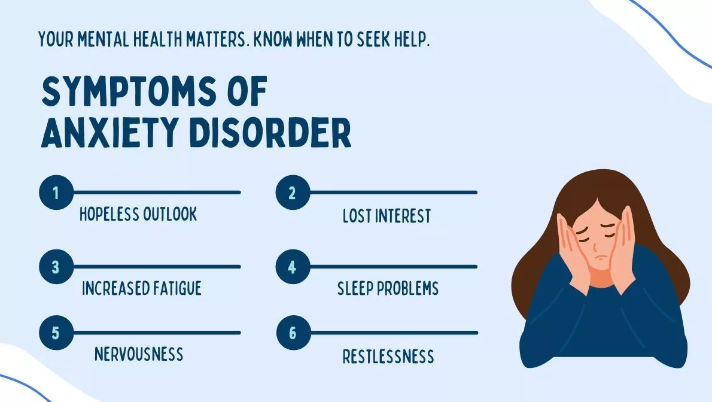An anxiety attack is a sudden surge of intense fear and discomfort that comes on quickly and peaks within minutes. It’s a very overwhelming experience that can feel like you’re losing control or even dying, even though there’s no real danger.
Here’s a breakdown of the key aspects of an anxiety attack:
- Sudden Onset: Anxiety attacks arise abruptly, often without any clear warning or trigger. You might be feeling perfectly calm one moment and then experience a wave of intense anxiety the next.
- Intensity: The fear and discomfort associated with an anxiety attack are severe. It can feel like the world is spinning, your heart is racing, and you might have trouble breathing.
- Short Duration: While the experience can be very frightening, anxiety attacks are typically short-lived, usually reaching their peak intensity within 10 minutes and subsiding within 30 minutes.
Symptoms of Anxiety attack :
It can manifest in a variety of physical and emotional symptoms. Here are some of the most common ones:
-
Physical Symptoms Of Anxiety attack:
- Palpitations or racing heart
- Shortness of breath or feeling like you’re choking
- Chest pain or tightness
- Sweating
- Nausea or stomach cramps
- Dizziness or lightheadedness
- Trembling or shaking
- Feeling hot or flushed
- Numbness or tingling
-
Emotional Symptoms of Anxiety attack:
- Intense fear or dread
- Feeling of losing control or going crazy
- A sense of impending doom
- Feeling detached from reality (derealization)
- Feeling like you’re outside of your body (depersonalization)
Causes and Triggers:
The exact cause of anxiety attacks is unknown, but they are thought to be a combination of biological and psychological factors.
Some common triggers include:
- Stressful life events (job loss, relationship problems, financial difficulties)
- Medical conditions (thyroid problems, heart problems)
- Certain medications
- Substance abuse (caffeine, alcohol, drugs)
- Underlying mental health conditions (panic disorder, generalized anxiety disorder)
It’s important to note that not everyone who experiences these symptoms is having an anxiety attack. If you’re concerned about your experience, it’s always best to consult a healthcare professional for proper diagnosis.
Here are some additional points to consider:
- It can be very distressing, but they are not harmful in themselves.
- There are effective treatments available for anxiety attacks, such as therapy and medication.
- If you experience anxiety attacks, there are also coping mechanisms you can learn to manage them in the moment.
Remember, you’re not alone. It is a common experience, and there is help available.
Delving Deeper into Anxiety Attacks: Understanding the Surge, Symptoms, and Strategies for Coping
Those sudden and overwhelming bursts of intense fear, can be debilitating and frightening. They can strike seemingly out of the blue, leaving you gasping for air, with a racing heart and a sense of impending doom. But what exactly are they, and how can you navigate these episodes?
This comprehensive guide unpacks the complexities of anxiety attacks, exploring their causes, symptoms, and effective coping mechanisms. By understanding these episodes, you can equip yourself with the knowledge and tools to manage them effectively and reclaim control during these overwhelming moments.
Unveiling the Roots of Anxiety Attacks: A Multifaceted Approach
The exact cause of anxiety attacks remains elusive, but researchers believe it’s a complex interplay of biological and psychological factors. Here’s a closer look at some potential contributors:
-
Neurotransmitters: These chemical messengers in the brain, particularly imbalances in serotonin and norepinephrine, are thought to play a role in anxiety regulation. When these neurotransmitters are out of whack, it can contribute to an anxiety attack’s emotional and physical symptoms.
-
Genetics: Studies suggest a genetic predisposition to anxiety disorders, including anxiety attacks. If you have a family history of anxiety, you may be more susceptible.
-
Stress: Stressful life events, chronic work pressures, relationship problems, and financial difficulties can all trigger anxiety attacks. Stress activates the body’s fight-or-flight response, leading to the physical symptoms often associated with anxiety attacks.
-
Medical Conditions: Certain medical conditions, such as thyroid problems, heart arrhythmias, and low blood sugar, can mimic symptoms of anxiety attacks. It’s important to rule out any underlying medical causes with your doctor.
-
Substance Abuse: Excessive caffeine intake, alcohol abuse, and certain recreational drugs can all lower the threshold for anxiety attacks.
-
Mental Health Conditions: Anxiety attacks are often a symptom of underlying mental health conditions like panic disorder, generalized anxiety disorder, and phobias.
It’s important to note that not everyone who experiences these symptoms is having an anxiety attack.
The Maelstrom of Symptoms: Recognizing the Physical and Emotional Signs
It manifest in a variety of ways, with both physical and emotional symptoms that can be incredibly distressing. Here’s a breakdown of the common signs to watch out for:
-
Physical Symptoms:
- Cardiovascular: Racing heart (palpitations), chest pain or tightness, shortness of breath, feeling like you’re choking.
- Autonomic: Sweating, chills, hot flashes, numbness or tingling sensations, dizziness or lightheadedness.
- Gastrointestinal: Nausea, stomach cramps, diarrhea.
- Muscular: Trembling or shaking, muscle tension.
-
Emotional Symptoms:
- Intense Fear or Dread: A feeling of overwhelming fear or terror, often without a clear cause.
- Sense of Loss of Control: Feeling like you’re losing control of your mind or body, like you’re going crazy.
- Impending Doom: A sense that something terrible is about to happen, even though there’s no real danger.
- Derealization: Feeling detached from reality, as if the world around you is unreal or dreamlike.
- Depersonalization: Feeling like you’re outside of your body, observing yourself from a distance.
The intensity and combination of these symptoms can vary greatly from person to person. Some people may experience only a few mild symptoms, while others experience a full-blown attack with a multitude of intense symptoms.
Effective Strategies for Coping with Anxiety Attacks
There are steps you can take to manage the overwhelming emotions and physical sensations. Here are some effective coping mechanisms:
- Grounding Techniques: These techniques help you reconnect with the present moment and reduce dissociation. Try deep breathing exercises, focusing on your senses (sight, touch, smell, sound), or repeating a calming mantra.
- Relaxation Techniques: Progressive muscle relaxation, guided imagery, and mindfulness meditation can help calm your body and mind. Practice these techniques regularly, so you have them readily available during an attack.
- Challenge Negative Thoughts: Anxiety attacks are often fueled by negative thoughts and catastrophic thinking. Challenge these thoughts by asking yourself if they’re realistic and what evidence supports them.
- Focus on Your Breath: Taking slow, deep breaths can help regulate your heart rate and slow down your body’s fight-or-flight response.
- Seek Support: If you’re with someone during an attack, let them know what’s.

